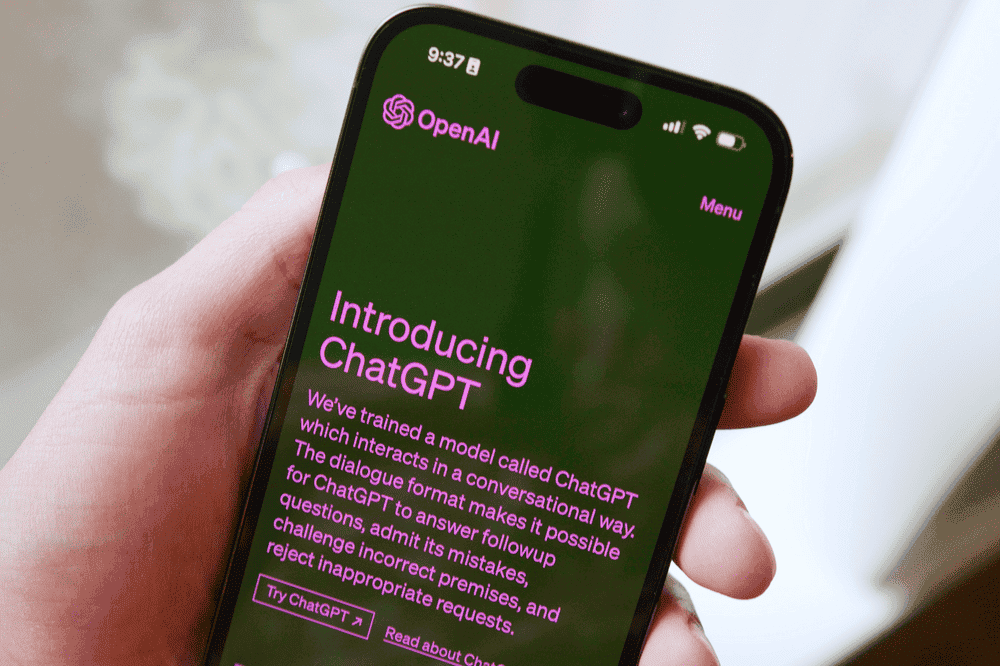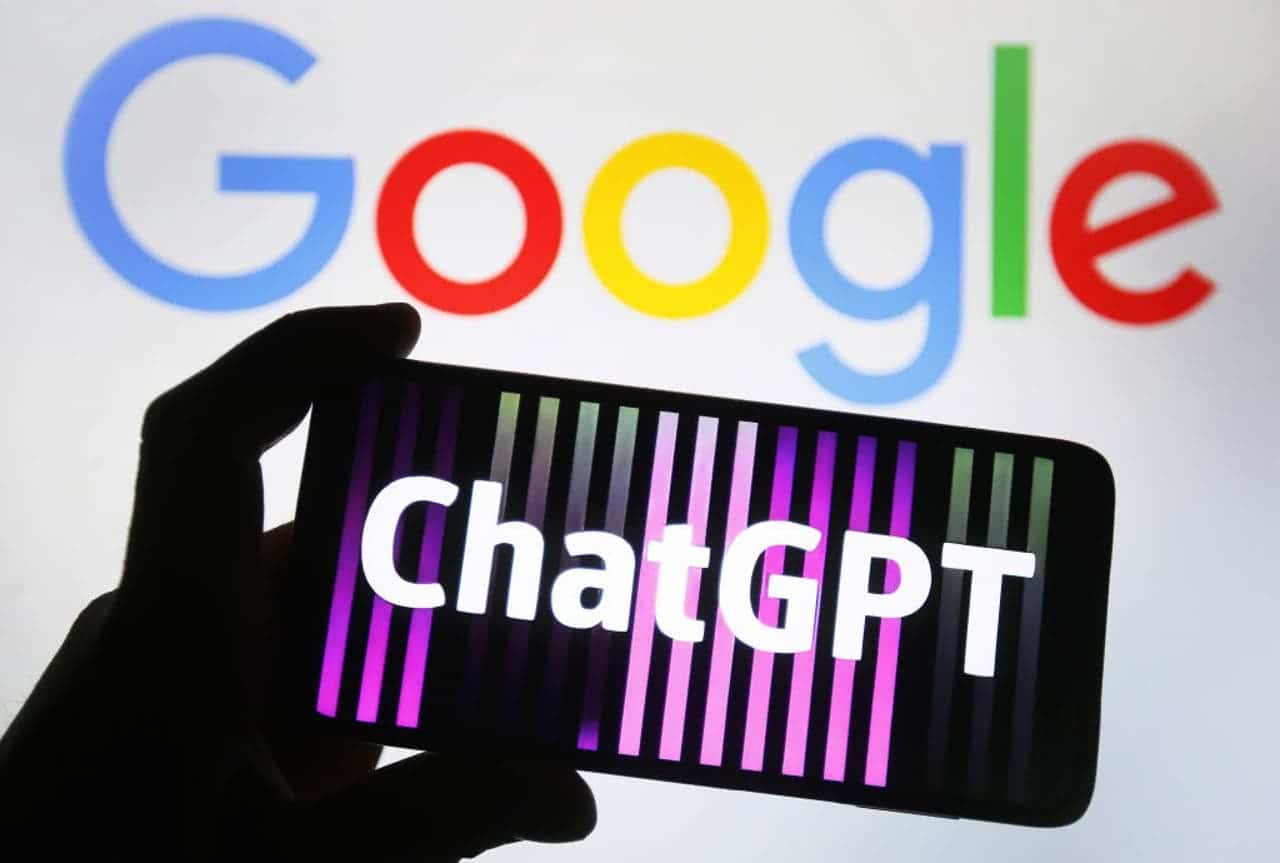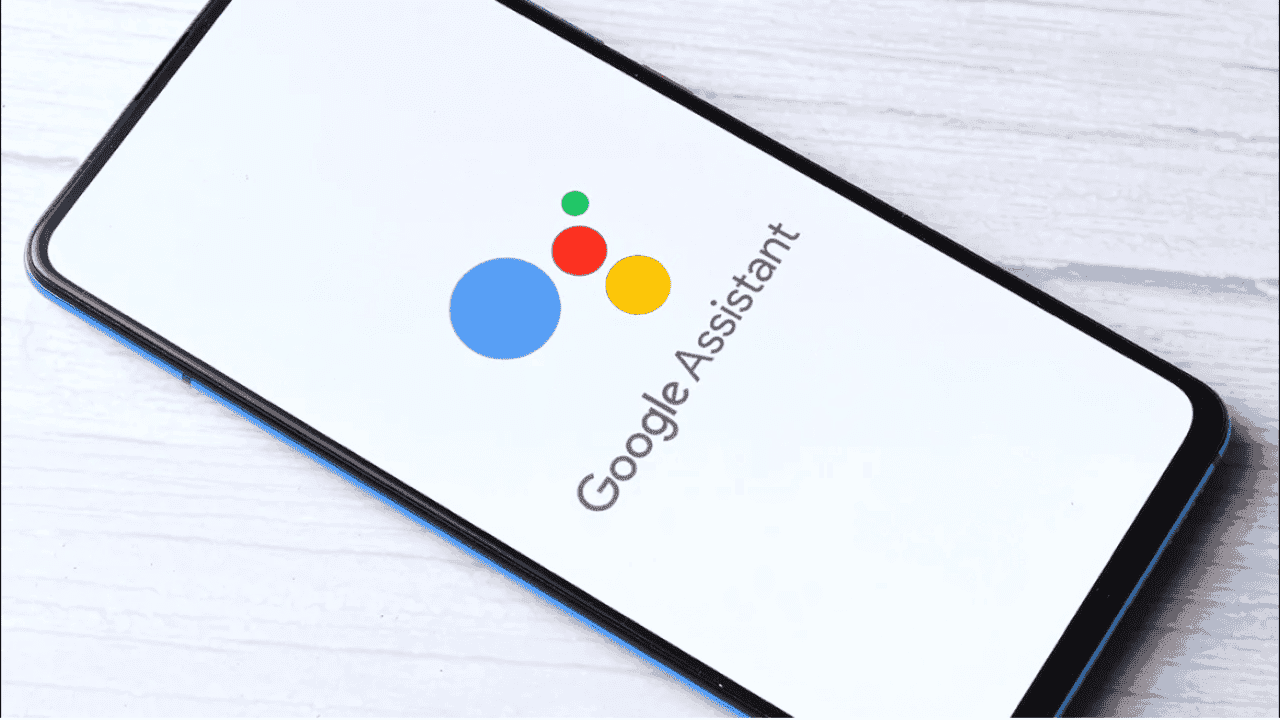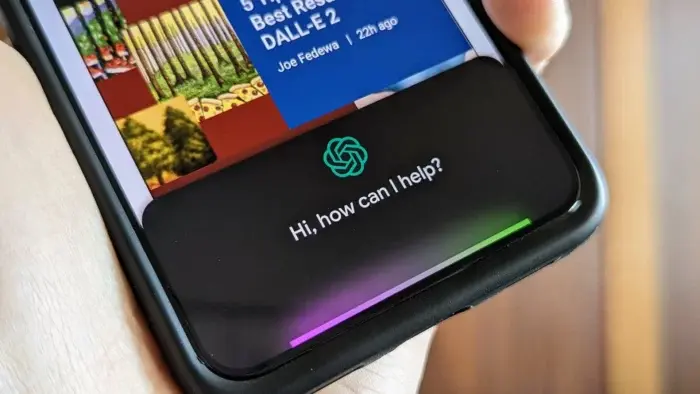The dominating technological trend in 2023 was the rise of generative AI, notably exemplified by chatbots such as OpenAI’s ChatGPT. Amidst this burgeoning wave, one notable avenue for harnessing ChatGPT’s capabilities on your Android device is through the official ChatGPT app developed by OpenAI. The app provides a seamless interface, requiring users to simply input or voice their queries, followed by a brief processing period during which the chatbot formulates a relevant response. Yet, despite the convenience it offers, there is a discernible inconvenience—users must manually launch the app to engage with the chatbot, a departure from the intuitive activation mechanisms associated with virtual assistants like Google Assistant.
ChatGPT: Could it replace Google Assistant on Android

Recognizing this limitation, recent findings by Mishaal Rahman from Android Authority within the code of the ChatGPT Android app, version 1.2023.352, hint at a prospective solution. An APK teardown, a method of analyzing the code of an Android application, unveiled a new activity named “com.openai.voice.assistant.AssistantActivity.” While currently disabled by default, enabling and launching this activity reveals an overlay on the screen. Featuring the familiar swirling animation akin to the in-app voice chat mode. Intriguingly, this overlay extends across other apps. Suggesting the potential for users to interact with ChatGPT seamlessly from any screen by invoking this assistant.
However, practical testing revealed that the animation failed to conclude, with the activity closing before interaction. This discrepancy may arise from the feature being in an unfinished state or controlled by an internal flag. Emphasizing the speculative nature of features unveiled through APK teardowns.
Further examination indicates that the ChatGPT app may not be fully prepared for its envisaged role as a “default digital assistant app.” The recently added XML file named “assistant_interaction_service” holds essential declarations. Including sessionService, recognitionService, and supportsAssist, which are prerequisites for an app to function as a default digital assistant. However, the absence of corresponding declarations in the app’s Manifest suggests that the necessary groundwork for this role is incomplete.
Unlocking the Power of ChatGPT
Despite this, the existence of the XML file implies OpenAI’s intention to position the ChatGPT app as Android’s default digital assistant. Such a designation would streamline accessibility. Allowing users to launch it through familiar actions like long-pressing the home button or swiping up from a bottom corner. Although the app may lack the ability to create custom hotwords or respond to existing ones due to privileged APIs exclusive to trusted, preinstalled apps, the strategic move aligns with OpenAI’s objective to retain user engagement amidst the impending launch of Google Assistant with Bard.
In a bid to further enhance user experience, the latest version of the Android app introduces a Quick Settings tile, currently disabled by default. This feature appears designed as a shortcut to activate ChatGPT’s new assistant mode, as indicated by the underlying code. Notably, it seems that accessing this feature may necessitate a ChatGPT Plus subscription, although functionality testing remains inconclusive.
As these potential features await official confirmation from OpenAI, the prospect of ChatGPT becoming more seamlessly integrated into the Android user experience prompts consideration. Would the ability to access ChatGPT as effortlessly as Google Assistant influence your usage patterns on Android? As technology continues to evolve, the quest for user-friendly interfaces and intuitive interactions remains paramount. And the trajectory of ChatGPT’s integration into Android exemplifies this ongoing pursuit.
ChatGPT: A Deep Dive into its Features and Comparison with Digital Assistants
ChatGPT, developed by OpenAI, is a powerful language model that has taken the AI world by storm. Its ability to generate human-quality text, engage in conversations, and even write different creative text formats has captured the imagination of many. But where does it stand compared to other digital assistants? Let’s delve into its features and see how it stacks up.
ChatGPT’s Features:
- Conversational fluency: ChatGPT excels at natural and engaging dialogue, making it feel more like a companion than a robotic assistant. It can follow and adapt to context, even handle humor and sarcasm with surprising adeptness.
- Creativity and imagination: ChatGPT’s strength lies in its ability to generate different creative text formats, like poems, code, scripts, musical pieces, emails, letters, etc. This opens up possibilities for storytelling, brainstorming, and artistic expression.
- Open-ended questions and problem-solving: ChatGPT can navigate complex topics and delve into open-ended questions, offering insights and exploring possibilities beyond factual responses. This can be valuable for brainstorming, research, and even philosophical discussions.
- Code generation and translation: ChatGPT can generate basic code and translate languages with decent accuracy, showcasing its versatility in technical domains.
Comparison with other Digital Assistants:
- Google Assistant:
- Strengths: Deep integration with Android, broad range of features, accuracy and reliability.
- Weaknesses: Less conversational, limited creativity, occasional factual errors.
- Amazon Alexa:
- Strengths: Excellent smart home control, vast library of skills, hands-free interaction.
- Weaknesses: Can feel robotic in dialogue, limited imagination, primarily task-oriented.
- Siri:
- Strengths: Tight integration with Apple devices, personalized voice recognition, convenient for basic tasks.
- Weaknesses: Limited conversational abilities, not very creative, often relies on web searches.
Overall
ChatGPT is a remarkable language model with the potential to revolutionize how we interact with technology. Its strengths lie in its conversational fluency, creativity, and ability to explore complex topics. However, its limitations in functionality, accuracy, and privacy raise concerns that need to be addressed. Whether it can compete with established digital assistants depends on its development, integration with existing platforms, and ability to overcome its shortcomings.
The future of AI assistants is full of possibilities, and ChatGPT, with its unique strengths, is sure to play a significant role in shaping its trajectory. The key lies in harnessing its capabilities while responsibly addressing its ethical and technical challenges.
Could ChatGPT compete with Google Assistant as the main assistant on Android?

ChatGPT and Google Assistant are both powerful language models with distinct strengths and weaknesses, making it difficult to say definitively whether ChatGPT could compete as the main assistant on Android. Here’s a breakdown of their capabilities:
Google Assistant:
-
Strengths:
- Deep integration with Android: Google Assistant is seamlessly woven into the Android ecosystem, offering tight control over device functions like settings, apps, and notifications.
- Broad range of features: It can handle various tasks, from setting alarms and playing music to controlling smart home devices and providing information.
- Focus on accuracy and reliability: Google prioritizes factual correctness and avoids generating misleading or biased responses.
-
Weaknesses:
- Conversational limitations: Google Assistant can sometimes feel robotic and struggle with casual conversation or humor.
- Less creative: It excels at practical tasks but may not be as adept at imaginative storytelling or open-ended questions.
ChatGPT:
-
Strengths:
- Conversational fluency: ChatGPT excels at engaging in natural, human-like dialogue, making it feel more like a friend or companion.
- Creativity and imagination: It can generate different creative text formats, like poems, code, scripts, musical pieces, email, letters, etc., and can be more playful and humorous than Google Assistant.
-
Weaknesses:
- Limited functionality: ChatGPT is primarily focused on text generation and lacks the integration with device features and broad range of applications that Google Assistant offers.
- Accuracy concerns: While ChatGPT is constantly improving, its responses can sometimes be factually incorrect or biased, requiring careful evaluation by the user.
So, could ChatGPT compete?
It’s certainly possible. As language models continue to evolve, the lines between virtual assistants and conversational AI are blurring. ChatGPT’s strengths in natural conversation and creativity could appeal to users who value a more engaging and personalized assistant experience. However, Google Assistant’s deep integration with Android and focus on accuracy and reliability remain significant advantages.
Ultimately, the success of ChatGPT as a potential Android assistant would depend on several factors, including:
- Openness from Google: Google would need to be open to integrating ChatGPT or similar technology into its ecosystem.
- Addressing accuracy concerns: ChatGPT would need to make significant strides in ensuring the factual correctness and reliability of its responses.
- User preferences: Whether users prioritize functionality and accuracy over a more conversational and creative experience would play a crucial role.
It’s an exciting space to watch, and the competition between these language models could lead to even more powerful and versatile virtual assistants in the future.
The potential ethical implications of using AI chatbots as virtual assistants and their impact on privacy and security

The rise of AI chatbots as virtual assistants presents a plethora of exciting possibilities, but also a wave of ethical concerns regarding privacy, security, and societal impact. Let’s delve into the potential ethical landmines we need to navigate as we embrace these technological marvels.
Privacy and Data Collection:
-
Data vacuum cleaners: Chatbots, like sponges, absorb copious amounts of user data through interactions, voice recordings, and app usage. This raises concerns about data ownership, transparency, and potential misuse.
-
Surveillance creep: Ever-present chatbots could lead to constant monitoring and data analysis, blurring the lines between convenience and intrusion. Who controls this data, and how is it used to influence or manipulate users?
-
Algorithmic bias: Chatbots trained on biased data can perpetuate societal prejudices in areas like hiring, loan approvals, and even criminal justice. Ensuring fairness and ethical data practices is crucial to prevent discriminatory outcomes.
Security and Manipulation:
- Hacking and identity theft: Chatbots vulnerable to hacking could expose sensitive user data, making them prime targets for malicious actors. Robust security measures are essential to safeguard user privacy.
- Disinformation and fake news: AI’s ability to generate convincing text can be weaponized to spread misinformation and sow discord. Verifying information and promoting media literacy are critical to combatting online manipulation.
- Social engineering and emotional manipulation: Chatbots adept at mimicking human emotions could be used to exploit user vulnerabilities for financial gain or social control. Fostering responsible AI development and user awareness is crucial.
Societal Impact:
- Job displacement: Automation through chatbots could lead to job losses, particularly in customer service and administrative roles. Reskilling and retraining programs are necessary to mitigate the negative economic impact.
- Dehumanization and social isolation: Overreliance on chatbots for companionship and emotional support could lead to social isolation and a decline in real-world human interaction. Striking a balance between technological convenience and meaningful human connection is essential.
- Loss of agency and autonomy: Algorithmic decision-making by chatbots in areas like healthcare or education could limit user control and raise concerns about fairness and transparency. Upholding human oversight and individual decision-making is paramount.
Navigating these ethical dilemmas requires a multi-pronged approach:
- Transparency and user control: Users should have clear and accessible information about data collection, usage, and algorithmic decision-making. They should also have control over their data and the ability to opt out of data collection or chatbot interactions.
- Robust security measures: Developers must implement robust security protocols to protect user data from unauthorized access and cyberattacks. Regular security audits and penetration testing are crucial to identify and address vulnerabilities.
- Ethical AI development: Developers, policymakers, and researchers must collaborate to establish ethical guidelines and frameworks for AI development and deployment. These guidelines should address issues like bias, fairness, transparency, and accountability.
- Media literacy and user education: Educating users about the capabilities and limitations of chatbots, as well as the potential risks associated with their use, is crucial to promote responsible and safe interactions.
By acknowledging and addressing these ethical concerns, we can ensure that AI chatbots evolve as beneficial tools that empower and enrich our lives, rather than posing a threat to our privacy, security, and fundamental human values. Remember, with great technological power comes great ethical responsibility. Let’s use AI responsibly and shape a future where humans and machines thrive together.






Do not invest in any trading platform, there is nothing such as get rich quick, it doesn’t always end well. I was also a victim to this kind of scam. An Asian girl introduced me to ibitminers and i got really deep into their shit and all i can say is these scammers are good at what they do. I was allowed to withdraw a little amount which i believed was to build my trust but they sucked me dried and i never got my capital after all was said and done. I lost a ton of asset and when i reported to local authorities i was told since crypto is untraceable, there is nothing they can do about it. I couldn’t get any help from them until i contracted the service of a professional ethical hacker. He hacked into the eth wallet address i made payment to and retrieved my stolen crypto and he showed me the transaction history of these scammers, I was in shock.
If you find yourself lost in the depths of lost Bitcoin, facebook and Whatsapp hacking to catch your cheating partner, let Osecybersailing’s team guide you towards the light of redemption.
Facebook page: Osecybersailing
Email: osecybersailing@cyberservices.com
Whatsapp: +4917617861530